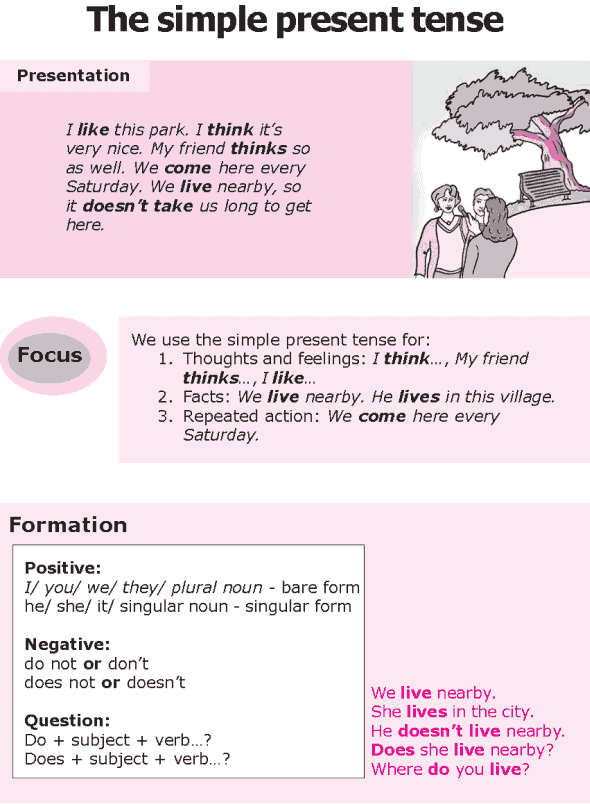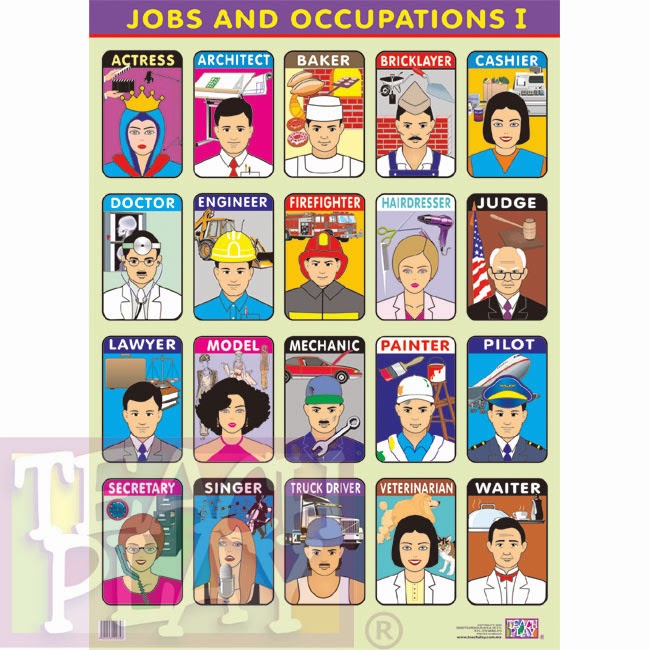Simple Present Tense
English Grammar Rules
We use the present tense:
1. For repeated or regular actions in the present time period.
- I take the train to the office.
- The train to Berlin leaves every hour.
- John sleeps eight hours every night during the week.
- The President of The USA lives in The White House.
- A dog has four legs.
- We come from Switzerland.
- I get up early every day.
- Carol brushes her teeth twice a day.
- They travel to their country house every weekend.
- It rains a lot in winter.
- The Queen of England lives in Buckingham Palace.
- They speak English at work.
Verb Conjugation & Spelling
We form the present tense using the base form of the infinitive (without the TO).In general, in the third person we add 'S' in the third person.
| Subject | Verb | The Rest of the sentence |
|---|---|---|
| I / you / we / they | speak / learn | English at home |
| he / she / it | speaks / learns | English at home |
1. For verbs that end in -O, -CH, -SH, -SS, -X, or -Z we add -ES in the third person.
- go – goes
- catch – catches
- wash – washes
- kiss – kisses
- fix – fixes
- buzz – buzzes
- marry – marries
- study – studies
- carry – carries
- worry – worries
- play – plays
- enjoy – enjoys
- say – says
Negative Sentences in the Simple Present Tense
To make a negative sentence in English we normally use Don't or Doesn't with all verbs EXCEPT To Be and Modal verbs (can, might, should etc.).- Affirmative: You speak French.
Negative: You don't speak French.
- Affirmative: He speaks German.
Negative: He doesn't speak German.
Negative Contractions
Don't = Do notDoesn't = Does not
I don't like meat = I do not like meat.
There is no difference in meaning though we normally use contractions in spoken English.
Word Order of Negative Sentences
The following is the word order to construct a basic negative sentence in English in the Present Tense using Don't or Doesn't.| Subject | don't/doesn't | Verb* | The Rest of the sentence |
|---|---|---|---|
| I / you / we / they | don't | have / buy eat / like etc. | cereal for breakfast |
| he / she / it | doesn't |
Remember that the infinitive is the verb before it is conjugated (changed) and it begins with TO. For example: to have, to eat, to go, to live, to speak etc.
Examples of Negative Sentences with Don't and Doesn't:
- You don't speak Arabic.
- John doesn't speak Italian.
- We don't have time for a rest.
- It doesn't move.
- They don't want to go to the party.
- She doesn't like fish.
Questions in the Simple Present Tense
To make a question in English we normally use Do or Does. It has no translation in Spanish though it is essential to show we are making a question. It is normally put at the beginning of the question.- Affirmative: You speak English.
Question: Do you speak English?
- Affirmative: He speaks French.
Question: Does he speak French?
We DON'T use Do or Does in questions that have the verb To Be or Modal Verbs (can, must, might, should etc.)
Word Order of Questions with Do and Does
The following is the word order to construct a basic question in English using Do or Does.| Do/Does | Subject | Verb* | The Rest of the sentence |
|---|---|---|---|
| Do | I / you / we / they | have / need want etc. | a new bike? |
| Does | he / she / it |
Remember that the infinitive is the verb before it is conjugated (changed) and it begins with TO. For example: to have, to eat, to go, to live, to speak etc.
Examples of Questions with Do and Does:
- Do you need a dictionary?
- Does Mary need a dictionary?
- Do we have a meeting now?
- Does it rain a lot in winter?
- Do they want to go to the party?
- Does he like pizza?
Short Answers with Do and Does
In questions that use do/does it is possible to give short answers to direct questions as follows:| Sample Questions | Short Answer (Affirmative) | Short Answer (Negative) |
|---|---|---|
| Do you like chocolate? | Yes, I do. | No, I don't. |
| Do I need a pencil? | Yes, you do. | No, you don't. |
| Do you both like chocolate? | Yes, we do. | No, we don't. |
| Do they like chocolate? | Yes, they do. | No, they don't. |
| Does he like chocolate? | Yes, he does. | No, he doesn't. |
| Does she like chocolate? | Yes, she does. | No, she doesn't. |
| Does it have four wheels? | Yes, it does. | No, it doesn't. |



















































